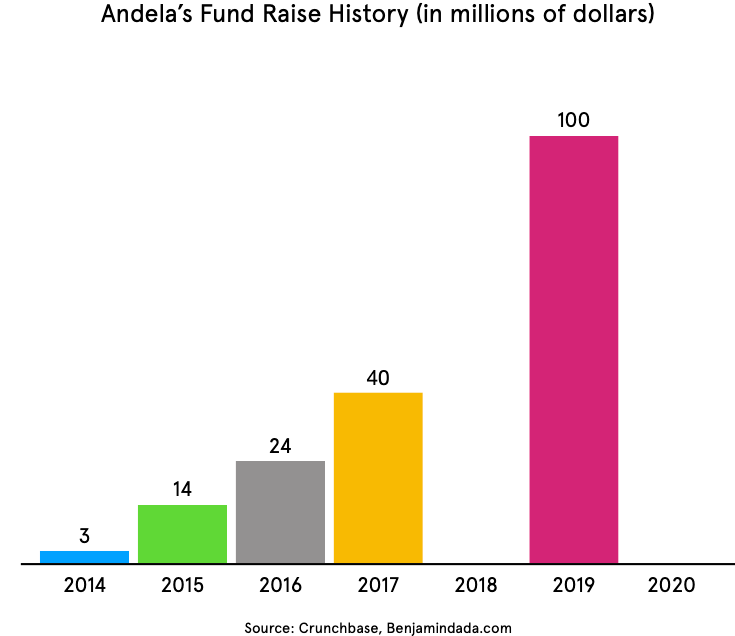Explaining Andela's third round of lay-offs within 9 months
In nine months, Andela has rid itself of over 500 employees. Here is their next move.

On Tuesday, 5th May 2020, the CEO of Andela, Jeremy Johnson, announced the lay-off of 135 employees, at an emergency "all hands" meeting.
Founded in 2014, Andela was a startup that trained and outsourced technical talents. Today, it is "an engineering-as-a-service business that helps companies build remote teams", according to its website.
Their model utilises low-cost labour in Africa and high wage rate in the US. While the engineers work from six African countries: Nigeria, Kenya, Uganda, Rwanda, Egypt and Ghana, their sales team works out of the US, close to their major clients. Andela's clientele base includes Coursera, GitHub, Pluralsight, InVision, Viacom and The Linux Foundation.
Headquartered in the US, the startup has raised $181 million from philanthropic investments firms and venture capitals.

According to Crunchbase, "2018 was the year supergiant VC deals became a nearly everyday occurrence". About a 2018 article by The New York Times, "$100 Million Was Once Big Money for a Startup. Now, It's Common." Indeed, Andela raised its biggest round yet in January 2019, $100 Million.
But what happens after a big raise? An even bigger raise. Either from private investors or the public (through an IPO). Because these startups "must move even faster, expand their ambitions and collect more investment money than ever".
Andela has kept up with this pace as it takes them less than 15 months to announce another raise. We expect them to announce another round this month, or as soon as they "show promise and the ability to put $100 million or more to use".

This "promise" is what Johnson is trying to "show" with Andela, a venture-backed startup. "...our ability to attract future investment is determined by the ratio of how quickly we grow in comparison to how much we spend to achieve that growth. If you aren't growing, you can't count on raising more money, so you have to adjust expenses, so you don't spend more than you bring in", said Johnson.
The race to profitability, which shows growth, began a while ago. But it became more pronounced as the company faced a difficult time in 2019. "We had a tough year in 2019", Johnson said in an email.
Revenue was not coming in as projected, yet costs held steady. In 2019 they restructured their business. They went from a learning organisation to a delivery organisation. That is, from paying Africa's youth to learn and upskill in tech to providing the service of experienced engineers to organisations. So in May 2019, they launched a campaign to hire mid to senior-level engineers. This restructuring made 420 junior developers redundant by September 2019.

The startup doesn't seem to have recovered from the arduous 2019. "When budgeting at the end of last year, we planned for significant growth". But 2020 "...still feels like an elongation of that difficult period", Johnson admits.
To further cut cost, Andela asked another set of developers to leave the company on their own accord, in February 2020. According to the internal memo cited by Weetracker, Andela launched a voluntary exit programme targeted at all developers who were unmatched with clients. The rationale must have been that anyone left after the September 2019 purge will be gainfully employed and making money for the company. But that appears not to have been the case.
Tougher times ahead
As the new year progressed, news about a pandemic, Coronavirus started to spread. Sadly, the US, which is Andela's primary clientele base, is one of the most hit with over 1.29 million cases and 75,000-plus deaths. As such, it has not been business as usual as many enterprises are looking to cut cost, to make it out of this alive.
Andela is not the only US startup that has laid staff off (10% of the company). Uber and Airbnb have done the same by laying off 14% and 25% of their company, respectively.
"While our customer base has held up better than most, the majority have still been impacted by the economic downturn", Johnson says.

As a result, Andela predicts that clients will pause their contracts with them. And it'll be unlikely to get any new customers in this season.
Hence, leading to the decision of Andela, to cut their own cost, as an organisation.
They approached cost-reduction in three phases: non-headcount related, salary reductions and downsizing, as a last resort.
Although the US labour laws favour "at-will" employment, many other countries, where Andela operates, favour contract employment. At-will employment states that employers can terminate employees at any time for any reason, so long it is not illegal. As a result, Andela's lay-offs typically come with a severance package in lieu of notice and out of courtesy.
We do not know how many developers remain at Andela but what we know is that this recent wave of lay-offs hurt none. "To be clear, no engineers are impacted by this reduction, but every other department is", Johnson said. "Certain teams like Technology were impacted less because they represent strategic investments we are making for the future. Later this week, we will be sharing more information about how these changes will impact how we operate moving forward".
What does the future hold for Andela?
While we wait for Andela to share further updates about their future, we can make some informed guesses.
The company which has shown a resolve to stay alive and become profitable will exist for longer. But their modus operandi will continue to evolve.
For one, the startup which helps other companies build remote teams might itself be going remote. Thanks, in part, to COVID-19 for forcing action. This move will reduce overhead costs of rent and facility management.
Second, the company will raise even more money, as projected earlier in the post. Finally, they would explore new business models.
In conclusion, although the way we do business has evolved, the rules for sustainability remains the same—grow revenue, reduce cost or die.






